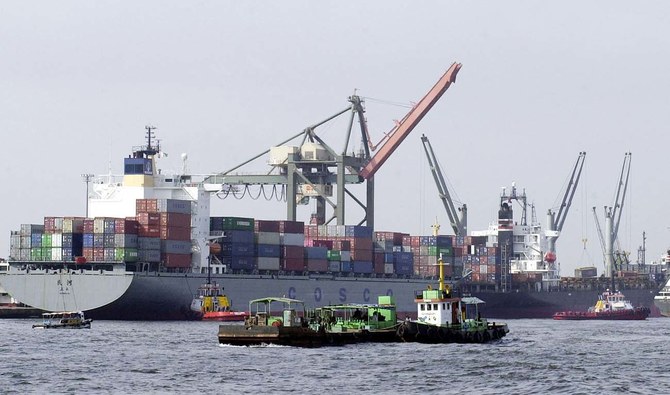KARACHI: Representatives of Pakistani exporters on Tuesday announced they would observe a “black day” next week in which all exports would be halted to protest new taxation measures in the federal budget 2024-25
The South Asian country hopes its plan to raise taxes in the proposed budget and boost state revenues will help it win approval from the IMF for a loan to stave off another economic meltdown.
Pakistan has set a challenging tax revenue target of $47 billion for the next fiscal year, a 40 percent jump from the current year to strengthen the case for a new bailout deal. The big rise in the tax target is made up of a 48 percent increase in direct taxes and 35 percent hike in indirect taxes. Non-tax revenue, including petroleum levies, is seen increasing by a whopping 64 percent.
Taxes have notably been slapped on previously protected export-oriented sectors such as textiles, which consistently make up over half of Pakistan’s exports, and whose receipts keep a persistently high external account deficit in check.
Immediately after the budget speech, the representative body for the sector, All Pakistan Textile Mills Association, had called for a review, terming the budget “extremely regressive” and one that “threatens the collapse of the textile sector and its exports.” It warned of “dire consequences for employment and external sector stability, as well as for overall economic and political stability and security.”
“On Export Black Day, not a single export consignment will be dispatched from the entire country,” Jawed Bilwani, chief coordinator of the All Exports Association of Pakistan, said at a press conference on Tuesday.
Representatives of 20 export sector associations announced a symbolic strike to protest what they called the failure of the government to maintain a fixed tax regime and the approval of a proposal for 29 percent tax on exported income.
As part of the strike, over 20 export industries will observe an “Export Black Day” next week and halt all exports. If the exporters’ demands were not met, they would announce further actions, Bilwani said.
Under the fixed tax regime, Pakistan exporters had to pay 0.25 percent as Export Development Fund(EDF) and withholding tax of 1 percent of export turnover in addition to 0.25 to 0.35 percent bank charges which constituted 1.85 percent of the total turnover, according to exporters. With new tax measures, exporters said they would not be able to cover operational costs and may need to shut down.
“This budget is detrimental to exports,” Iftikhar Ahmed Sheikh, President of the Karachi Chamber of Commerce and Industry (KCCI), said, adding that proposals in the budget would compel exporters to entirely cease operations.
Addressing another press conference at the Karachi Press Club, fruit and vegetable exporters warned that placing exports under the normal tax regime would have a “very serious impact” on the economy of Pakistan.
“Abolition of fixed tax regime will significantly reduce exports and closure of export units will lead to widespread unemployment,” Waheed Ahmed, the Patron-in-Chief of All Pakistan Fruit and Vegetable Exporters Association (PFVA), said. “The tax revenue targets will not be met, shortage of foreign exchange will further depreciate rupee above all.”
The end of the fixed tax regime will also require exporters to maintain records of their income, expenditure and profits which they said was not possible under current circumstances due to supply chain issues.
“In the case of the 29 percent tax imposed on export income in the Federal budget 2024-25, the focus of exporters will be diverted from the main goal of enhancing the export of fruits and vegetables from Pakistan since they will spend more time in maintaining records of income, expenditure and profit,” Ahmed added.
In a separate press conference, Chairman of Pakistan Gem and Jewelry Traders and Exporters Association (PGJTEA) Habib-ur-Rahman said the export industry of gold jewelry was currently suffering a “severe crisis.”
“Exports are suspended and the 18 percent sales tax requirement on advance gold purchase from foreign buyers under the Entrustment Scheme by the Federal Board of Revenue has dashed the hopes of exporters,” Rahman said, adding that the export of gold ornaments would be reduced from $100 million to $1-2 million if the sales tax exemption was not restored on the export of gold ornaments.
In a rare move, representatives of the country’s salaried class also lodged their protest against new taxation measures.
Ubaidullah Shareef, the President of Salaried Class Alliance Pakistan, a newly formed body, said the government had “further burdened” the already struggling salaried class.
“The salaried class pays three times more tax than exporters and retailers,” Shareef said, highlighting that educated segments of society were leaving the country due to oppressive taxes.
















